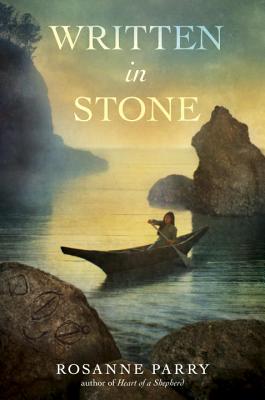WRITTEN IN STONE by Rosanne Parry is a story about the struggles of one girl, Pearl, to help her family, her people, her Native culture survive. Many phrases will continue to echo in your heart:
“I could raise him out of the water with words.”
Pearl wants to hunt whales, as her father once did. She imagines herself standing at the prow of a canoe, harpoon in hand, poised, waiting for a whale to lift its huge head up out of the Alaskan waters as it offers itself to her tribe, the Makah. If she cannot hunt whales, she will hunt stories and save them so that in some future time, they can be once again be sung, drummed and danced.
The power of words, the transformations of masks, and the mysticism of drumming come alive on these pages:
“This is what Indians do…” – explains Pearl’s aunt –“…all of us. It doesn’t matter if we are cowboys or farmers or ironworkers or fishermen. We all drum.” And then Pearl “picked up my drumsticks again and followed Susie…the drum beats grew harder, softer, faster and then finally slower and deeper, moving to the middle of the drum. When we finished, we were sweating as if we’d run in the mountains.”
As a teacher on the Native American Reservation of Washington’s Olympic Peninsula, Rosanne Parry heard some of these stories and was enchanted by the songs, chants and stories of the Quinault and Makah people. In this book, WRITTEN IN STONE, Rosanne invites the reader to step into the difficult times of the 1920’s when these whaling and fishing cultures were having their whale-hunting rights and land ownership threatened and stolen.
I asked Roseanne to comment on two questions:
1. What inspired you to write this story now or have you been working on it – thinking about it – for many years since teaching on the Reservation?
Roseanne Parry: I’ve been thinking about this story ever since the Makah began to work toward resuming their whale hunts in 1990s. I wrote dozens of drafts of this story in the 90s revising as new information became available and as I grew as a writer. This is the story that won me my first Work in Progress grant from Oregon Literary Arts. It’s also the story that got me my agent. Stephen Fraser read this story when it was written in blank verse and offered me representation in 2005. But Heart of a Shepherd sold first so I rewrote Written in Stone several more times, moving it back to first person prose and changing the ending. When I finally had the story in a form that I felt strongly about, I went back to my sources in Taholah one last time to ask them to vet the story and answer some questions that research alone would never give me. They did and I made a few adjustments in regard to how the community processed grief. With those revisions in place I took it to my editor. It’s hard to believe I finished the first draft of this story when my oldest girl was in the 3rd grade. She graduated from college last month. And yet I’m glad I waited. This is the story I was trying to tell all along and there has never been a better time to have a multicultural book on the market.
2. What do new information or awareness do you hope a reader will remember from this story?
Rosanne Parry: My biggest hope for any of my books is that it would become a springboard for conversation. I hope that this book gets kids asking questions about Native American communities in their own states. Where did those tribes live years ago? Where do they live now? Are their traditional means of work still available or have they taken on new work? Are their traditional arts and languages still practiced today? What has been lost? And in your own family, what parts of your culture are most important to you? What have you saved over many generations? What has been lost over time?
To my thinking what the book leads to in conversation and further investigation of ideas is far more important than anything on the page.
Enjoy this wonderful, interesting and important book!
Nancy Bo Flood

7 comments for “WRITTEN IN STONE”